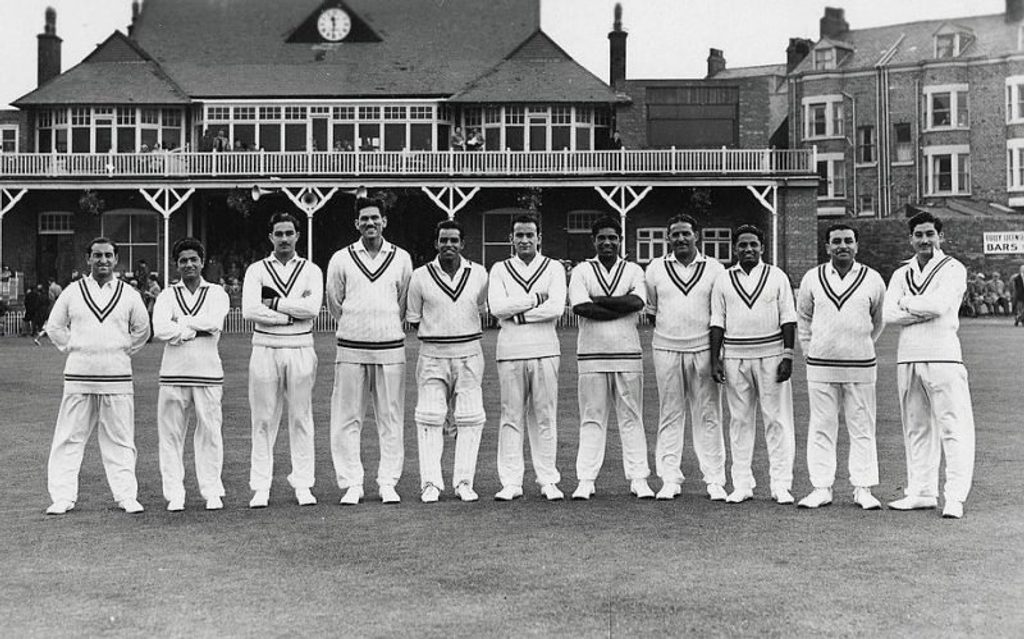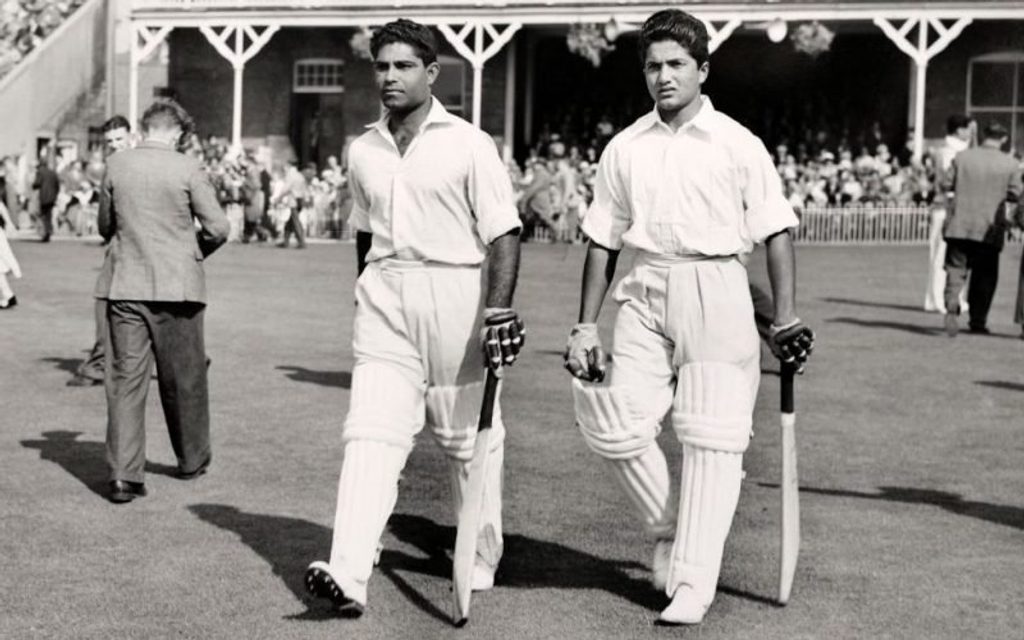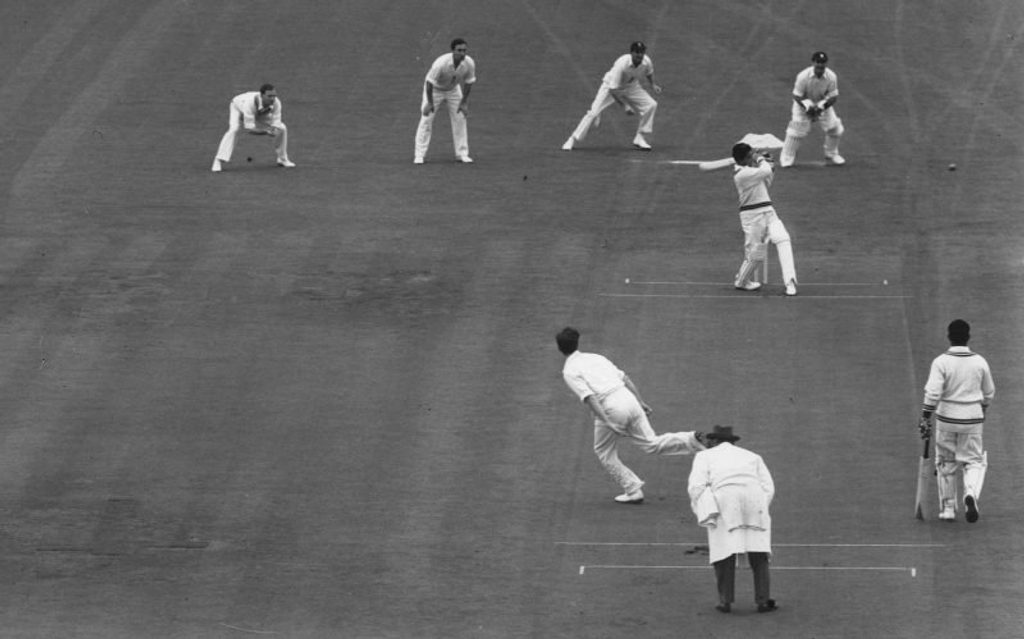
Hanif Mohammad was Pakistan’s first great batsman, and a player blessed with remarkable powers of concentration. His Wisden obituary in 2017 told the story of a remarkable career.
Hanif Mohammad died on August 11, 2016, aged 81.
Hanif Mohammad was only 16 when he walked out to bat in the first unofficial Test between Pakistan and MCC at Lahore in November 1951. It was his first-class debut, and a match of overwhelming significance for his country. He stood 5ft 3in and weighed barely nine stone. “He looked about 12,” said Brian Statham. But, as the day progressed, sympathy evaporated: Hanif made 26 in 165 minutes. “We never looked like shifting him.”
The MCC attack were the first to experience what bowlers around the world would discover over the next two decades: bowling to Hanif was the most thankless job in cricket. In the next game, he batted more than four hours for 64, as Pakistan chased down 288. It was an innings of incalculable value: eight months later, they were granted Test status.
Having dug Pakistani cricket’s foundations, Hanif set about erecting its walls. With Abdul Hafeez Kardar as captain and Fazal Mahmood as strike bowler, he was part of a formidable triumvirate who carried the emerging nation’s hopes. Despite his stature, Hanif shouldered the responsibility – time after time constructing monumental innings of concentration, courage and exemplary defence. “He lacked a sense of cricket as a sport, let alone entertainment,” wrote Peter Oborne in Wounded Tiger, a history of Pakistan cricket. “For Hanif it was a solemn duty, indeed a vocation, whose fundamental purpose was to ensure that his country was not defeated.”
There was no better example than his match-saving 337 in 16 hours ten minutes – Hanif remained convinced it was 16 hours 39 (or 999 minutes) – against West Indies in Barbados in 1957/58. Pakistan seemed destined for a crushing defeat when they followed on 473 adrift, with more than three days of the six remaining. Hanif reached stumps on 61, having survived a barrage of bouncers from Roy Gilchrist by opting not to hook, after a word of advice from Clyde Walcott. On the fourth day, he added exactly 100 – Pakistan lost only one wicket – and began to entertain the possibility of a draw. Back in his hotel room, Hanif found motivational messages from Kardar: “You are the only hope to save Pakistan.”
On the fifth, he defied pain from thighs bruised by Gilchrist, and sunburn that caused the skin under his eyes to peel away. During intervals he would sit in a corner of the dressing room and eat a piece of chicken. By stumps he had 270, and Pakistan a small lead. That night he allowed himself to fantasise about Len Hutton’s Test-record 364 and, after tuning in to Radio Pakistan, realised the impact he was having at home. On a deteriorating final day pitch, he was within 28 of passing Hutton when he edged Denis Atkinson to wicketkeeper Gerry Alexander. It was then the longest first-class innings, and remains the longest in Tests. He slept all night in his kit.
 Pakistan team during their first tour of England, led by Maqsood Ahmed, circa 1954
Pakistan team during their first tour of England, led by Maqsood Ahmed, circa 1954
Hanif was the most celebrated member of perhaps the most remarkable family in cricket history. He was the third of five brothers, three of whom – Wazir, Mushtaq and Sadiq – also became Test players, while the other, Raees, was once Pakistan’s twelfth man. Hanif, Mushtaq and Sadiq all played against New Zealand at Karachi in 1969/70 – Hanif’s final Test – thus emulating W.G., E.M. and G.F. Grace, for England against Australia in 1880. At least one of the brothers played in Pakistan’s first 89 Tests, and Hanif’s son Shoaib later played in 45.
Hanif was born in Junagadh in the Indian state of Gujarat, where the family enjoyed an affluent lifestyle, with space for matches that frequently involved him batting all day. They played with a tennis ball shaved on one side for prodigious swing, or a cork ball that flew off a concrete terrace. Techniques were honed, reflexes sharpened. Batsmen were given out for shots that rebounded off trees, and he quickly learned to keep the ball on the ground.
 Hanif Mohammad (right) and Alimuddin walk out to bat for Pakistan during their tour match against TN Pearce’s XI at Scarborough in September 1954
Hanif Mohammad (right) and Alimuddin walk out to bat for Pakistan during their tour match against TN Pearce’s XI at Scarborough in September 1954
Following Partition in 1947, his extended family left their possessions and travelled to Karachi, where high rents forced them to live in an abandoned Hindu temple. “We lost everything,” Hanif said. His father, a good club cricketer, soon died, but the boys were urged to excel at sport by their mother, Ameerbi, a successful badminton and carrom player. Hanif’s potential was quickly identified, and he moved schools to work with Abdul Aziz Durani, who advised him to concentrate on cricket and spent hours in one-to-one sessions. Durani threw golf balls to teach him to pull and cut, and umpired matches so he could bat for as long as possible.
A triple-century in an important schools’ final earned his first extensive newspaper coverage. And, playing for Sind and Karachi Muslims against an experienced Northern Muslims side, including Fazal, on a matting wicket at the Karachi Gymkhana, he made 158 in almost eight hours, admitting: “I surprised myself.” His reward was a bicycle from an admiring businessman.
In 1952, Hanif toured England for the first time with the Pakistan Eaglets, an initiative aimed at exposing the country’s emerging talents to English conditions. At his indoor school in south London, Alf Gover instantly compared Hanif to Don Bradman: “Everything is already perfect.” Against Devon at Torquay, Hanif was bowled in the first over by a ball that swung in the sea breeze. When his room-mate Sultan Mahmud returned after midnight from a party, he found Hanif, still kitted up, repeating the stroke he should have played in front of a mirror.
During Pakistan’s first Test tour, in India in 1952/53, Hanif began with a hundred in each innings against North Zone. In the Tests – where he also kept wicket in the first three games – he made 287 runs at nearly 36, including a six-hour 96 in the Third, at Bombay. He was dubbed the Little Master, which stuck. In 1954, Pakistan sailed to England, then the world’s most powerful team. It was a dismal summer and, in a rain-ruined opener at Lord’s, Hanif – free of wicketkeeping duties – batted 340 minutes in total for 59 runs. Pakistan lost the Second Test by an innings and, when they were bowled out cheaply again in the drawn Third at Old Trafford, some influential voices suggested their elevation to Test status had been hasty. Kardar’s team responded by squaring the series at The Oval with a nerve-shredding 24-run victory, sealed by Hanif’s direct hit to run out Jim McConnon.
 Hanif Mohammed unleashes a pull-shot off Brian Statham at the at The Oval
Hanif Mohammed unleashes a pull-shot off Brian Statham at the at The Oval
Wazir led the tour averages, but 19-year-old Hanif – who by now had grown three inches – top-scored, with 1,623 at 36. His mannerisms were becoming familiar: between balls he would twiddle his bat, adjust his sweater, and tug his cap. He did not move forward or back, relying on his eye to assess length. “At first purely defensive,” said Wisden, “he later blossomed into a most attractive opening batsman, bringing off delightful all-round strokes with a power his slight build belied.”
Against India the following winter, in Pakistan’s first home series, he scored his first Test hundred – 142 in eight and a half hours at Bahawalpur. His feats brought him celebrity, and its trappings. “He was recognised everywhere –every street, every building, every hotel,” said his brother Sadiq. To avoid the distraction of making a living, he was awarded public-sector jobs that meant he could concentrate on cricket, and given land to build a bungalow after his heroics in the Caribbean. Perhaps in response to the pressure, he became a solitary, self-contained figure, retreating to his room on tour to listen to sitar music.
In January 1959, he cemented his status with the highest score in first-class cricket. His 499 for Karachi against Bahawalpur in the Quaid-e-Azam Trophy semi-final surpassed Bradman’s 452 for New South Wales 29 years earlier. It took less than 11 hours, with Hanif scoring 230 runs on one day, and 244 the next – numbers he would often quote to prove he was no blocker. He recalled just one chance, given on one of only two occasions he hit the ball in the air, and was run out going for a second from the penultimate ball of the day. He thought he had made 497, only to learn that the boys manning the scoreboard had short-changed him by two. “I was really furious,” he said. “Had I known that, I would have waited for the last delivery to get the required runs.” He remained at the summit until 1994, when Brian Lara made his unbeaten 501 for Warwickshire against Durham.
For Pakistan, Hanif remained rock-like, often showing bravery as well as skill. Against West Indies at Karachi in 1958/59, he suffered a broken finger late on the fourth day as Pakistan chased 88. He batted on to spare a team-mate an awkward few minutes, retiring hurt next morning and missing the rest of the series. And in India in 1960/61, he appeared in all five Tests, despite having had his toenails removed because of a foot infection: his mother had convinced him national pride was at stake.
In the First Test at Bombay, he ignored medical advice, playing in a pair of specially adapted shoes. “It was like batting with nails piercing your feet – a cricketing crucifixion,” he said. He rated his first-innings 160 as his greatest performance. And Hanif was also at the crease on the fourth day against Australia at Karachi in 1959/60, when Dwight D. Eisenhower arrived with Pakistan’s recently installed military leader, General Ayub Khan, who was keen for his visitor to see the country’s most famous sportsman. Hanif batted most of the day for 40 not out, but Eisenhower left early as Pakistan dawdled to 104 by stumps – the second slowest complete day in Test history. No American president has watched Test cricket since.
The 1960s were a struggle for Pakistan and, as the pioneers slipped into retirement, the captaincy passed to Hanif. His first assignment, a solitary Test against Australia in Karachi in 1964/65, saw six players make their debuts, including Asif Iqbal and Majid Khan, and there were three more new faces for the return at the MCG a month later. It was the first time Hanif had batted in Australia but – just as he had in England in 1954 and the West Indies in 1957/58 – he adapted instantly, making 104 and 93. “That second innings was the best I saw him play,” said Asif. “It was grey overhead and the pitch was difficult, but his technique was equal to it.” Hanif met Bradman, who had expected a tall, powerful figure, and was delighted to discover otherwise.
In 1967, he brought a team of tyros to England. At Lord’s he shared an eighth-wicket partnership of 130 with Asif, who was caught in the deep for 76: “Afterwards in the Pavilion he said, ‘I’m proud of you, but very disappointed with how you got out. As a batsman you have to go on and get hundreds – your concentration needs to be much better.’“ Hanif underlined his point by batting more than nine hours across three days in a match-saving undefeated 187. Wisden made him a Cricketer of the Year.
Despite that, Pakistan lost 2-0, and Hanif was stripped of the captaincy. He played just four more Tests, and became embroiled in a bitter disagreement with Kardar, now the chairman of selectors. Hanif thought he could still contribute, but Kardar wanted him to retire immediately, and suggested it might be better for the careers of his brothers if he did. Feeling he was being blackmailed, Hanif stepped down, having played 55 Tests and scored 3,915 first-class runs at 44, with 12 hundreds. He carried on in domestic cricket until the mid-1970s, ending with 17,059 first-class runs at 52.
He worked for Pakistan International Airlines, managing their team to three successive Wills Cup wins in the 1980s, ran the PIA colts scheme with his trademark zeal, and oversaw the early development of several future Test players. He was also a selector. His death marked the end of an era, and sparked an inevitable discussion about whether he ranked above Javed Miandad, Inzamam-ul-Haq and Younis Khan as Pakistan’s greatest batsman. “I have no doubt he was,” said Asif. “He played in an era when Pakistan were one of the weakest sides, and had a huge responsibility. If you look at all the people who have scored Test triple-centuries, very few did so in conditions alien to them, against strong bowling attacks and without the benefit of protective clothing.” Sadiq put it more succinctly: “Whenever he went in to bat, the country was glad he was there.”








